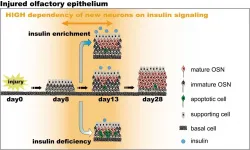INFORMATION:
Researchers reveal new tool to help prevent suicide
A team of Welsh academics has developed a new method of supporting health professionals to make clinical decisions about people who may be at risk of taking their own lives
2021-05-17
(Press-News.org) A team of Welsh academics has developed a new method of supporting health professionals to make clinical decisions about people who may be at risk of taking their own lives.
While the UK may have one of the lowest rates of suicide in the world, it is still the biggest cause of death in men under 45, so being able to make a Structured Professional Judgement about who might attempt suicide and knowing how to intervene is vitally important.
Researchers at Swansea and Cardiff universities have put together the Risk of Suicide Protocol (RoSP) which guides a professional to look at 20 aspects of a person's life known to be related to suicide. They can then formulate what the person's problems are and how they can be helped.
In two studies the team first examined if the RoSP could identify suicides from accidental deaths in people known to mental health services living in the community who had died unexpectedly, and secondly, if it could determine who would be likely to attempt suicide in a hospital caring for people at very high clinical risk.
The research, which has just been published by leading international journal Frontiers in Psychiatry, showed just how effective the RoSP is in both settings.
Professor Nicola Gray, from Swansea University, was working therapeutically with patients at very high clinical risk at the time of the study.
She said: "The RoSP came about as we were training healthcare professionals on how to identify and manage violence to others in the people they were caring for. The clinicians said their most significant clinical difficulty was in spotting and managing people's risk of harming themselves.
"We were asked to develop something to identify and improve safety planning in those at-risk people. Looking carefully at best practice guidelines we were able to put together a list of known risk indicators that were reasonably easy to identify for clinicians, and, importantly, could be the focus of intervention."
However, Professor Robert Snowden, of Cardiff University, said there is still need for caution: "We are never going to detect all cases or prevent all suicides. Many people die by suicide without ever seeing a professional. However, we hope the use of RoSP will help those that do see a mental health professional by providing a systematic review of the person's situation and clinical presentation.
"We need to look at settings such as A&E departments, prisons, GP surgeries, and other places where there may be people who are at risk of suicide."
Swansea University's Professor Ann John, who is Chair of the Welsh Government's national advisory group on suicide and self-harm prevention, was also involved in the research.
She added: "Prediction of suicidal behaviours is notoriously difficult and the use of clinical risk assessment tools to 'predict' future suicide risk is not recommended by NICE.
"The RoSP is a structured clinical assessment that supports clinicians in the identification of modifiable risk factors which can then be addressed. This is consistent with 'needs based approaches' and helps focus the assessment on a person's situation, how best to manage risk factors and develop a safety plan for any future crises. "
ELSE PRESS RELEASES FROM THIS DATE:
Insulin is necessary for repairing olfactory neurons
2021-05-17
PHILADELPHIA (May 17, 2021) - Researchers have known for some time that insulin plays a vital role in regeneration and growth in some types of neurons that relay environmental sensory information to our brains, such as sight. However, they know relatively little about the role of insulin in the sense of smell. Now, investigators at the Monell Chemical Senses Center have shown that insulin plays a critical role in the maturation, after injury, of immature olfactory sensory neurons (OSNs). The team published their findings in eNeuro earlier this month.
"Our findings suggest ...
Bird data from Ethiopia fills in baseline data gaps
2021-05-17
One of the projected effects of a warming climate for species living on mountain slopes is moving their distributions upslope as their habits shift upwards. Eventually, since mountains have a limit to their elevation, a species may have no more habitat to move up to and therefore go extinct. Tracking how and where this is happening is tough, though, if you don't have a good idea of where the species are now. That's the situation in places such as Africa, which have tremendous biodiversity but spotty ecological baseline data.
So University of Utah researchers set out to assess the status of bird species in Ethiopia's Bale Mountains through six years' worth of bird banding efforts at five sites. The sites spanned ...
Ethnicity, geography and socioeconomic factors determine likelihood of detecting serious congenital
2021-05-17
Mothers who are Hispanic or who come from rural or low socioeconomic status neighborhoods are less likely to have their child's critical heart condition diagnosed before birth, according to a new study in the journal Circulation.
This is the largest and most geographically diverse study of these challenges to date. The study compared patient data of more than 1,800 children from the United State and Canada diagnosed with two of the most common, and the most serious, critical congenital heart defects: hypoplastic left heart syndrome (HLHS), when the left side of the heart is not developed completely, and transposition of ...
Finerenone may delay onset of AFib in patients with chronic kidney disease, diabetes
2021-05-17
Patients with chronic kidney disease and Type 2 diabetes who took the experimental drug finerenone were about 30% less likely to develop the heart rhythm disorder atrial fibrillation (AFib) than those taking a placebo, according to data presented at the American College of Cardiology's 70th Annual Scientific Session.
Last year, researchers reported that the trial, called FIDELIO-DKD, met its primary endpoint showing a significant benefit of finerenone, a nonsteroidal, selective mineralocorticoid receptor antagonist, in terms of a composite of sustained decrease in kidney function, kidney failure and renal death. The new analysis reveals that patients derived these benefits regardless of their history with AFib and suggests that taking finerenone also reduced the rate of ...
'Hyperinvasive' care improves survival in refractory out-of-hospital cardiac arrest
2021-05-17
A subgroup of patients who experienced an out-of-hospital cardiac arrest (OHCA) that did not respond to standard advanced cardiac life support (ACLS), were immediately transported to a cardiac care center, and placed on a device similar to a heart-lung bypass machine were more likely to have survived with good brain function six months later than similar patients who received standard care at the site where the OHCA occurred. The study was presented at the American College of Cardiology's 70th Annual Scientific Session.
"This study--the largest randomized clinical trial that has been conducted to address this question--shows that a hyperinvasive ...
Hidden diversity
2021-05-17
The ocean is a big place with many deep, dark mysteries. Humans have mapped no more than 20% of the sea, and explored less. Even the kelp forests of Southern California -- among the best studied patches of ocean on the planet -- hide species not yet described by science.
Now, UC Santa Barbara's Thomas Turner has published a paper in the journal Zootaxa describing four new species of sponges. These novel specimens weren't dredged from the murky depths or found on some distant seamount, but collected locally from popular dive spots. The study brings Turner's new species count to five, and the scientist believes there may be dozens yet to discover and describe along the West ...
Pet trade may pose threat to bushbaby conservation
2021-05-17
Southern lesser galagos (Galago moholi), a species of primate that lives in southern Africa, boast big, round eyes and are so small they can fit in your hand.
A new study from an international team of scientists, however, suggests that there may be a downside to their cuteness: The trade in lesser galagos, also known as bushbabies, which some people keep as pets, may have shifted the genetics within their wild populations over the span of decades, according to the research. Those changes could undercut the ability of the critters to adapt as human farms and cities grow throughout the region.
The study was published recently in the journal Primates and ...
Alcohol may have immediate effect on atrial fibrillation risk, events
2021-05-17
Alcohol appears to have an immediate--or near-immediate--effect on heart rhythm, significantly increasing the chance that an episode of atrial fibrillation (AFib) will occur, according to new data presented at the American College of Cardiology's 70th Annual Scientific Session.
The data revealed that just one glass of wine, beer or other alcoholic beverage was associated with twofold greater odds of an episode of AFib occurring within the next four hours. Among people having two or more drinks in one sitting, there was a more than threefold higher chance of experiencing AFib. Using an alcohol sensor placed on participants' ankles, which passively monitored alcohol intake, the investigators ...
COVID-19 hit stock markets as it spread from country to country
2021-05-17
As Covid-19 spread around the world, stock markets in individual countries took a major hit - yet stock markets in China where the disease first struck avoided significant falls - researchers at Lero, the Science Foundation Ireland Research Centre for Software found.
A research paper Immune or at-risk? Stock markets and the significance of the COVID-19 pandemic by a Lero team based at University of Limerick confirmed that the growth in COVID-19 cases largely explained changes in stock prices, but surprisingly did not have the same impact in China or on the global index ...
Brigham-led clinical trials take center stage at the American College of Cardiology
2021-05-17
Top experts from Brigham and Women's Hospital presented outcomes from some of the most-anticipated clinical trials in cardiology at the virtual American College of Cardiology's 70th Annual Scientific Session. In four Late-Breaking Clinical Trial presentations, Brigham cardiologists shared their latest findings on strategies to prevent future cardiovascular events in at-risk patient populations, results of a randomized clinical trial of a statin drug among patients critically ill with COVID-19, and more. ...
LAST 30 PRESS RELEASES:
A biological material that becomes stronger when wet could replace plastics
Glacial feast: Seals caught closer to glaciers had fuller stomachs
Get the picture? High-tech, low-cost lens focuses on global consumer markets
Antimicrobial resistance in foodborne bacteria remains a public health concern in Europe
Safer batteries for storing energy at massive scale
How can you rescue a “kidnapped” robot? A new AI system helps the robot regain its sense of location in dynamic, ever-changing environments
Brainwaves of mothers and children synchronize when playing together – even in an acquired language
A holiday to better recovery
Cal Poly’s fifth Climate Solutions Now conference to take place Feb. 23-27
Mask-wearing during COVID-19 linked to reduced air pollution–triggered heart attack risk in Japan
Achieving cross-coupling reactions of fatty amide reduction radicals via iridium-photorelay catalysis and other strategies
Shorter may be sweeter: Study finds 15-second health ads can curb junk food cravings
Family relationships identified in Stone Age graves on Gotland
Effectiveness of exercise to ease osteoarthritis symptoms likely minimal and transient
Cost of copper must rise double to meet basic copper needs
A gel for wounds that won’t heal
Iron, carbon, and the art of toxic cleanup
Organic soil amendments work together to help sandy soils hold water longer, study finds
Hidden carbon in mangrove soils may play a larger role in climate regulation than previously thought
Weight-loss wonder pills prompt scrutiny of key ingredient
Nonprofit leader Diane Dodge to receive 2026 Penn Nursing Renfield Foundation Award for Global Women’s Health
Maternal smoking during pregnancy may be linked to higher blood pressure in children, NIH study finds
New Lund model aims to shorten the path to life-saving cell and gene therapies
Researchers create ultra-stretchable, liquid-repellent materials via laser ablation
Combining AI with OCT shows potential for detecting lipid-rich plaques in coronary arteries
SeaCast revolutionizes Mediterranean Sea forecasting with AI-powered speed and accuracy
JMIR Publications’ JMIR Bioinformatics and Biotechnology invites submissions on Bridging Data, AI, and Innovation to Transform Health
Honey bees navigate more precisely than previously thought
Air pollution may directly contribute to Alzheimer’s disease
Study finds early imaging after pediatric UTIs may do more harm than good
[Press-News.org] Researchers reveal new tool to help prevent suicideA team of Welsh academics has developed a new method of supporting health professionals to make clinical decisions about people who may be at risk of taking their own lives


